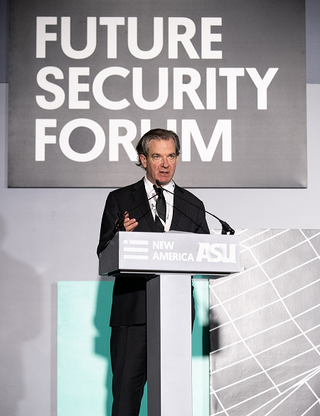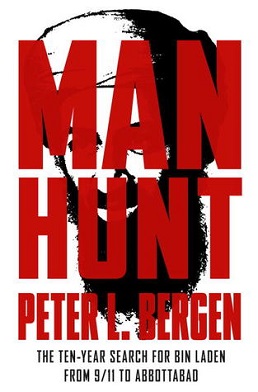Related Research Articles

Osama bin Mohammed bin Awad bin Laden was a Saudi Arabian-born Islamist dissident and militant leader who was the founder and first general emir of al-Qaeda from 1988 until his death in 2011. Ideologically a pan-Islamist, he participated in the Afghan jihad against the Soviet Union and supported the activities of the Bosnian mujahideen during the Yugoslav Wars. Bin Laden is considered to have been the mastermind behind the September 11 attacks in the United States.

Abbottabad is the capital city of Abbottabad District in the Hazara region of eastern Khyber Pakhtunkhwa, Pakistan. It is the 40th largest city in Pakistan and fourth largest in the province of Khyber Pakhtunkhwa by population. It is about 120 km (75 mi) north of Islamabad-Rawalpindi and 150 km (95 mi) east of Peshawar, at an elevation of 1,256 m (4,121 ft). Kashmir lies a short distance to the east.

The bin Laden family, also spelled bin Ladin, is a wealthy family intimately connected with the innermost circles of the Saudi royal family. It is the namesake and controlling shareholder of Saudi Binladin Group, a multinational construction firm. Following the September 11 attacks, the family became the subject of media attention and scrutiny through the activities of Osama bin Laden, the former head of al-Qaeda.
Raelynn J. Hillhouse is an American national security and Intelligence community analyst, former smuggler during the Cold War, spy novelist and health care executive.
Saʻd bin ʾUsāmah bin Muḥammad bin ʿAwaḍ bin Lādin, better known as Saad bin Laden, was one of Osama bin Laden's sons. He continued in his father's footsteps by being active in Al Qaeda, and was being groomed to be his heir apparent. He was killed in an American drone strike in 2009.
Osama bin Laden, the founder and former leader of al-Qaeda, went into hiding following the start of the War in Afghanistan in order to avoid capture by the United States and/or its allies for his role in the September 11 attacks, and having been on the FBI Ten Most Wanted Fugitives list since 1999. After evading capture at the Battle of Tora Bora in December 2001, his whereabouts became unclear, and various rumours about his health, continued role in al-Qaeda, and location were circulated. Bin Laden also released several video and audio recordings during this time.

Peter Lampert Bergen is an American journalist, author, and producer who is CNN's national security analyst, a vice president at New America, a professor at Arizona State University, and the host of the Audible podcast In the Room with Peter Bergen.

On May 2, 2011, Osama bin Laden, the founder and first leader of the Islamist militant group al-Qaeda, was shot and killed at his compound in the Pakistani city of Abbottabad by United States Navy SEALs of SEAL Team Six. The operation, code-named Operation Neptune Spear, was carried out in a CIA-led mission, with the Joint Special Operations Command (JSOC) coordinating the Special Mission Units involved in the raid. In addition to SEAL Team Six, participating units under JSOC included the 160th Special Operations Aviation Regiment (Airborne), also known as the "Night Stalkers", and the CIA's Special Activities Division, which heavily recruits from former JSOC Special Mission Units. The success of the operation ended a nearly decade-long manhunt for bin Laden, who was accused of masterminding the September 11 attacks on the United States.

Hamza bin Osama bin Mohammed bin Awad bin Laden, better known as Hamza bin Laden, was a Saudi Arabian-born member of al-Qaeda. He was a son of al-Qaeda leader Osama bin Laden, and, following his father's death in 2011, he was described as an emerging leader of the al-Qaeda organization.

Obama's Wars is a 2010 book written by Pulitzer Prize–winning investigative journalist Bob Woodward. The book was published by Simon & Schuster and released on September 27, 2010. It focuses on the internal debates and divisions within the Obama administration regarding the handling of the United States' involvement in the ongoing Iraq and Afghanistan wars. Woodward was interviewed by ABC News anchor Diane Sawyer to promote the book as well as PBS journalist Charlie Rose.

On May 2, 2011, United States President Barack Obama confirmed that al-Qaeda leader Osama bin Laden had been killed in his compound in Abbottabad, northeastern Pakistan. Bin Laden's death was welcomed by many as a positive and significant turning point in the fight against al-Qaeda and related groups. Those who welcomed it included the United Nations, European Union, NATO, and some nations in Asia, Africa, Oceania, South America, and the Middle East, including Yemen, Lebanon, Saudi Arabia, India, Israel, Indonesia, Somalia, the Philippines, Turkey, Iraq, Australia, Argentina, and the rebel Libyan Republic.

The death of Osama bin Laden on May 2, 2011, gave rise to various conspiracy theories, hoaxes and rumors. These include the ideas that he had died earlier, or that he lived beyond the reported date. Doubts about Bin Laden's death were fueled by the U.S. military's supposed disposal of his body at sea, the decision to not release any photographic or DNA evidence of Bin Laden's death to the public, the contradicting accounts of the incident, and the 25-minute blackout during the raid on Bin Laden's compound during which a live feed from cameras mounted on the helmets of the U.S. special forces was cut off.

Osama bin Laden's compound, known locally as the Waziristan Haveli, was a large, upper-class house within a walled compound used as a safe house for Saudi militant Islamist Osama bin Laden, who was shot and killed there by U.S. forces on 2 May 2011. The compound was located at the end of a dirt road 1,300 metres southwest of the Pakistan Military Academy in Bilal Town, Abbottabad, Khyber Pakhtunkhwa, Pakistan, a suburb housing many retired military officers. Bin Laden was reported to have evaded capture by living in a section of the house for at least five years, having no Internet or phone connection, and hiding away from the public, who were unaware of his presence.

Pakistan was alleged to have provided support for Osama bin Laden. These claims have been made both before and after Osama was found living in a compound in Abbottabad, Pakistan and was killed by a team of United States Navy SEALs on 2 May 2011. The compound itself was located just half a mile from Pakistan's premier military training academy Kakul Military Academy (PMA) in Abbottabad. In the aftermath of bin Laden's death, American president Barack Obama asked Pakistan to investigate the network that sustained bin Laden. "We think that there had to be some sort of support network for bin Laden inside of Pakistan", Obama said in a 60 Minutes interview with CBS News. He also added that the United States was not sure "who or what that support network was." In addition to this, in an interview with Time magazine, CIA Director Leon Panetta stated that US-officials did not alert Pakistani counterparts to the raid because they feared the terrorist leader would be warned. However, the documents recovered from bin Laden's compound 'contained nothing to support the idea that bin Laden was protected or supported by the Pakistani officials'. Instead, the documents contained criticism of Pakistani military and future plans for attack against the Pakistani military installations.
Arshad Khan, commonly known as Abu Ahmed al-Kuwaiti was a Kuwaiti-born Pakistani courier for Osama bin Laden.
Shakil Afridi, or Shakeel Afridi, is a Pakistani physician who allegedly helped the CIA run a fake hepatitis vaccine program in Abbottabad, Khyber Pakhtunkhwa, Pakistan, in order to confirm Osama bin Laden's presence in the city by obtaining DNA samples. Details of his activities emerged during the Pakistani investigation of the deadly raid on bin Laden's residence. This account is disputed in a recent account of events which implies Afridi was implicated as a cover for the real CIA operative. Afridi was arrested at the Torkham while trying to flee the country days after the raid. On 23 May 2012, he was sentenced to 33 years' imprisonment for treason, initially believed to be in connection with the bin Laden raid, but later revealed to be due to alleged ties with a local Islamist warlord Mangal Bagh. Lawyers appealed against the verdict on 1 June 2012. On 29 August 2013, his sentence was overturned and a retrial ordered.
The Abbottabad Commission was a judicial inquiry commissioned to provide reports on the circumstantial events leading up to the United States decision to take unilateral military actions in Abbottabad in Khyber-Pakhtunkhwa Province of Pakistan, with the objective of neutralizing al-Qaeda leader Osama bin Laden on May 2, 2011. Constituted by the Supreme Court of Pakistan on the request of the Government of Pakistan on 21 June 2011, the commission was chaired by the Senior Justice Javaid Iqbal and other members selected by the Supreme Court.

The Abbottabad Commission Report is a judicial inquiry paper authored and submitted by the Abbottabad Commission, led by Justice Javaid Iqbal, to the Prime Minister of Pakistan on 4 January 2013. The report investigates the circumstances surrounding the death of Osama bin Laden in Abbottabad. Upon submission, the report was immediately classified by the Prime Minister and its findings were not made public.

Nick Schifrin is an American journalist. He is the PBS NewsHour's foreign affairs and defense correspondent. He was previously Al Jazeera America's Middle East correspondent and a correspondent for ABC News in London and in Afghanistan/Pakistan.

Manhunt: The Ten Year Search for Bin Laden From 9/11 to Abbottabad is Peter Bergen's fourth book on the subject of Osama bin Laden and Al-Qaeda. It was originally published in 2012 and became a New York Times bestseller later that year. It would then become the basis for an HBO documentary, Manhunt: The Search for Bin Laden.
References
- 1 2 "Nahal Toosi". Politico. Retrieved 20 December 2019.
- 1 2 "Nahal Toosi". Pulitzer Center. Retrieved 20 December 2019.
- 1 2 "The Need to Know" (PDF). Carolina Alumni Review. February 2012. Retrieved 20 December 2019.
- 1 2 "Archives for Nahal Toosi". Politico. 2019. Retrieved 20 December 2019.
- ↑ "Pulitzer Center Journalist Nahal Toosi Campus Lecture". College of William & Mary. 2019. Retrieved 20 December 2019.
- ↑ "Nahal Toosi appears in the following". WNYC. 2019. Retrieved 20 December 2019.
- ↑ "Kurt Volker, U.S. Special Envoy To Ukraine, Resigns". WAMU. 27 September 2019. Retrieved 20 December 2019.
- ↑ "Ambassador Gordon Sondland's testimony: Everyone was 'in the loop'". KCRW. 20 November 2019. Retrieved 20 December 2019.
- ↑ Larsen, J. Carlisle (16 May 2017). "Source Claims President Trump Shared Classified Information With Russian Diplomats During White House Meeting". Wisconsin Public Radio. Retrieved 20 December 2019.
- ↑ "Nahal Toosi". Washington Examiner. 2019. Retrieved 20 December 2019.
- ↑ "Nahal Toosi". Washington Examiner. 2019. Retrieved 25 December 2019.